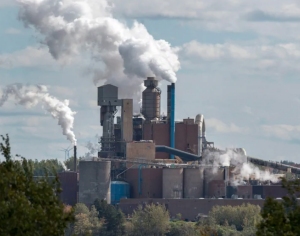
Nova Scotia's Forest Industry Faces Unknown Future without Northern Pulp A 2016 economic impact study found 6,100 direct forestry jobs in the province and Jeff Bishop, executive director of Forest Nova Scotia, estimates at least 2,550 of those are people connected to wood that eventually finds its way to Northern Pulp in one form or another.
A 2016 economic impact study found 6,100 direct forestry jobs in the province and Jeff Bishop, executive director of Forest Nova Scotia, estimates at least 2,550 of those are people connected to wood that eventually finds its way to Northern Pulp in one form or another.
Sawmill operators, woodlot owners contemplate effects of a potential Northern Pulp shutdown By Michael Gorman - CBC News Jan. 22, 2019 (CBC) - It was a few months ago that Jeff Bishop noticed a growing unease about the future of Nova Scotia's forest industry. Bishop, the executive director of Forest Nova Scotia, was suddenly taking more and more calls. On the other line were concerned industry members, all taking stock of what the potential loss of the Northern Pulp mill in Pictou County would mean for their livelihoods. As the legislated closure date of the mill's Boat Harbour treatment facility looms and no replacement approved, the future of the mill — which takes between 35 and 40 per cent of the pulpwood from the provincial market — remains murky. While there are differing opinions on the mill in terms of its history, operation and environmental footprint, there is mostly consensus on the role it plays within the forestry industry, both direct and indirect. A 2016 economic impact study found 6,100 direct forestry jobs in the province and Bishop estimates at least 2,550 of those are people connected to wood that eventually finds its way to Northern Pulp in one form or another. The top 11 sawmills in the province, which account for 96 per cent of the lumber made here, all have ties to Northern Pulp. More than 90 per cent of sawmill chips in the province end up there. Andrew Watters, general manager for Groupe Savoie's hardwood sawmill in Westville, said they get about 30 per cent of their logs from Northern Pulp. All their chips and bark go back to the pulp mill. "It's a pretty good part of our business plan," he said. "That sawmill waste helps pay your bills. If you don't have a market for that it's pretty hard on the equation." There are 50 people working at the Westville sawmill, which already struggles to get supply. As a result, the mill is only running one day a week — enough to keep employees' benefits in place and make pension contributions. If Northern Pulp were to close, Watters estimates mill production would drop to between six to eight months of the year. The links don't end there, said Bishop. "There's hundreds — if not thousands — of landowners that sell wood on the market, whether directly to Northern Pulp themselves or through another supplier that Northern Pulp may work with," he said. Because of how thin the margins can be in the forestry industry . . . The complete story is available on CBC's website: SOURCE: CBC PaperAge - editor's note: The Northern Pulp Nova Scotia Pulp Mill in Abercrombie Point, Pictou County, Nova Scotia has operated since 1967. The mill manufactures 280,000 tonnes per year of northern bleached softwood kraft (NBSK) — more commonly referred to as pulp — which is derived from wood fibre that is used in all types of paper products. The mill operates approximately 353 days per year and directly employs over 300 people. To learn more, visit: northernpulp.ca |